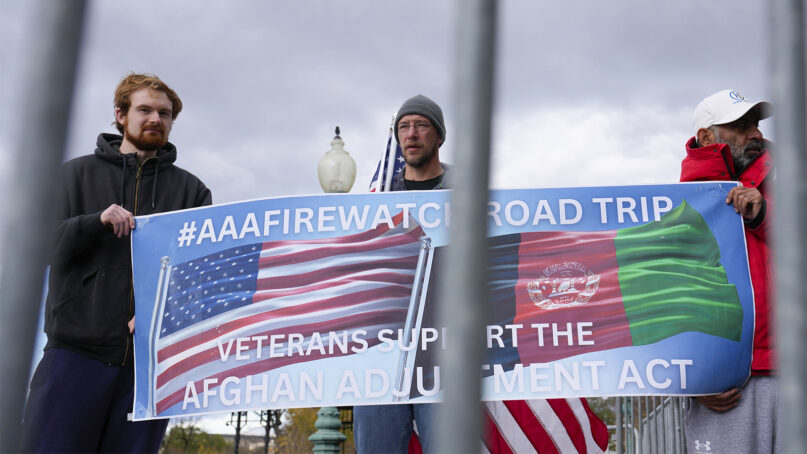(RNS) — Faith-based refugee resettlement agencies and hundreds of religious congregations are hoping for a last-minute miracle as Congress considers an omnibus spending bill.
The Afghan Adjustment Act, a measure that would streamline paperwork for Afghans who worked for U.S. government agencies in the Afghanistan War, was omitted from the bill, which Congress is aiming to pass before lawmakers head home for the Christmas holiday.
Some 76,000 Afghans who were airlifted out of the country before the U.S. withdrawal in August 2021 may lose their legal status unless a floor amendment reinserting the Afghan measure gains traction.

Krish O’Mara Vignarajah. Photo courtesy of Lutheran Immigration and Refugee Service
“Our view has been that it’s unacceptable to kick the can down the road to the next Congress after all the blood, sweat and tears Afghan veterans and their allies have poured into this bill,” said Krish O’Mara Vignarajah, president and CEO of Lutheran Immigration and Refugee Service, referring to the Afghan Adjustment Act.
Most of the Afghans evacuated from Afghanistan in 2021 were given a temporary two-year status called “humanitarian parole.” It expires in 2023, making them potentially subject to deportation.
The U.S. House flips to Republican control in 2023, and though the Afghan Adjustment Act has some Republican support, its passage will face a tougher political climate.
Republican Sen. Charles E. Grassley opposed the adjustment act’s inclusion in the omnibus bill, saying more needed to be done to beef up security vetting for Afghans.
LIRS is one of nine groups that partner with the federal government to help resettle refugees — six of which, like LIRS, are faith groups. LIRS, like many others, not only assists the refugees, but advocates publicly for their cause.
Other resettlement groups were similarly discouraged by the omission of the act from the omnibus bill. Mark Hetfield, president and CEO of HIAS, originally the Hebrew Immigrant Aid Society, called the exclusion “outrageous.”

HIAS CEO Mark Hetfield. Photo by Ralph Alswang
“Congress has in the past provided paths to permanent residency for Cubans fleeing the Castro regime, for Vietnamese and other refugees after the wars in Southeast Asia, and for Iraqis after Operation Desert Storm and Operation Iraqi Freedom,” Hetfield said in a statement. “Today, sadly, the United States Congress failed to rise to its obligation to stand with the Afghans who stood with us.”
RELATED: How race and religion have always played a role in who gets refuge in the US
High-ranking military leaders are also urging Congress to pass the Afghan Adjustment Act.
“If Congress fails to enact the AAA, the United States will be less secure,” said a letter from 30 retired officers, including three former chairs of the Joint Chiefs of Staff.
“To me, it’s a sacred commitment that we have, and I don’t just mean former military types. I mean the United States of America,” Adm. Mike Mullen told The Washington Post. “If anything should be above politics, this should be it. We should make sure that we take care of these people.”
The omnibus bill will provide funding for federal agency budgets through Sept. 30, 2023. It also includes several critical pieces of legislation, including the bipartisan election reform bill known as the Electoral Count Act.
Hundreds of churches, synagogues and mosques partnered with resettlement agencies or formed their own sponsor circles to help Afghan families transition to life in the United States.
The LIRS took some 14,000 Afghan evacuees under its wing, helping them find affordable housing, furniture, jobs, government benefits and language classes.
“Many experienced trauma as they were fleeing Afghanistan and are dealing with the anxiety surrounding their future,” said Vignarajah. “But they’ve found a sense of community. A significant population has landed jobs. They’ve brought skills, talent and drive to the U.S. Employers we’ve worked with have been so enthusiastic supporting them and knowing that they are quickly becoming contributing members to their community.”
RELATED: As Afghan evacuees overwhelm US aid agencies, Jewish groups step in as partners





